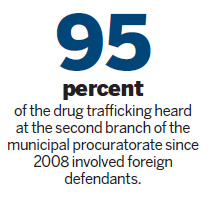
|
Police officers carry a box of drugs to a car for destruction on June 19. The drugs, weighing nearly 500 kg in total, included heroin, ecstasy and marijuana. Zhang Yu / for China Daily |

BEIJING - More than 95 percent of the 98 drug smuggling cases heard at the second branch of the Beijing Municipal People's Procuratorate since 2008 involved foreign defendants, an official of the municipal prosecuting authority said on Wednesday.
From 2008 to May 2011, the procurators established 98 drug trafficking cases, which accounted for 67 percent of the 147 smuggling cases, according to the procuratorate's statistics.
The procuratorate is responsible for handling all drug trafficking cases in Beijing.
Many of the foreign drug traffickers were from developing or under-developed countries in Southern Africa, Central Asia and Southeast Asia, where drug-related crime has a long history and is rampant, Gui Yang, head of the public prosecution department of the procuratorate, said at a news briefing.
Among the defendants, the number of women traffickers increased in recent years and drug smuggling has become a leading crime for female offenders, according to Gui.
"Women criminals usually get less attention from customs and can more easily hide drugs on their bodies," he said, citing the example of a pregnant woman who carried about 955 grams of drugs in her body as she entered China.
Li Wenjun, an associate professor at the Chinese People's Public Security University specializing in the investigation of drug smuggling, told China Daily the reasons for the increasing number of foreign traffickers were the county's fast economic development and a market of keen buyers.
"Most criminals who smuggled drugs into China came here as tourists or to work, and were often ignored by customs," she said.
"The majority of the African or Southeast Asian traffickers, especially the women, were very poor and had little education," she said. "Meanwhile, the demand for drugs in some coastal cities in our country encouraged these people."
Qu Hong, the head press officer with the prosecuting authority, said that many new and more elusive ways of smuggling drugs have started to emerge in the capital, such as hiding drugs in carpets, books and machine parts. He also said the amount of smuggled drugs had been increasing since 2008.
In 2008, the largest amount of trafficked drugs in a single case was 2.45 kg. By the end of 2010, it was 13 kg, according to statistics from the procuratorate.
"Now, customs can easily find drugs hidden on people, but sometimes it is hard to find drugs hidden in the layers of books," she said.
Dai Peng, director of the criminal investigation department at Chinese People's Public Security University, said the best way to solve these difficulties is to cooperate with foreign police and customs.
"We should first reach a consensus with foreign countries about cracking down on drug smuggling," he said. "Signing more bilateral and multilateral treaties will also help in the fight against drug trafficking."
Customs, the police and prosecuting authorities should communicate and cooperate more closely on the problem, he added.
China Daily
(China Daily 06/23/2011 page8)